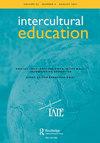教育与族群:米兹拉希教师的个人职业认同
IF 0.8
Q3 EDUCATION & EDUCATIONAL RESEARCH
引用次数: 0
摘要
以色列是一个多民族的国家。这种多样性表现在教师和学生之间,并影响学习、社会化和教育过程。种族多样性经常转化为一种等级制度,在这种制度下,某种文化背景比另一种文化背景更受青睐。那些排名靠后的人可能会经历沉默和部分身份被抹去的经历。这种情况对自尊、社会关系质量和社会流动性都有负面影响。尽管有相对广泛的关于种族和米兹拉希身份的写作,这些主题的教育研究是贫乏的。此外,大多数相关文献涉及学生的经验,而教师的经验几乎没有审查。本文以教师的民族认同为研究对象,从心理学和教育学的角度对教师的民族认同进行考察。它基于一项定性研究,其中进行了23次深入的半结构化访谈。通过对回应的分析,我们将试图更密切地了解教师在其身份的民族方面的经验,并深入研究与民族身份相关的主观感知,包括其隐含和亲密的方面。三个主要的见解可以促进敏感的文化和社会负责任的教育实践。本文章由计算机程序翻译,如有差异,请以英文原文为准。
Education and ethnicity: personal-professional identity of Mizrahi teachers
ABSTRACT Israel is an ethnically diverse country. This diversity is expressed among teachers and students and impacts learning, socialization, and education processes. Ethnic diversity frequently translates into a hierarchy in whose framework a certain cultural background is preferred over another. Those at the bottom of the ranking may experience silencing and erasure of parts of their identity. This situation has negative implications for self-esteem, the quality of social relations, and for social mobility. Despite there being relatively extensive writing about ethnicity and Mizrahi identity, educational research on these topics is meager. Moreover, most of the relevant literature addresses the experience of students whereas the experience of teachers is barely examined. This article focuses on the ethnic identity of teachers and examines it from psychological and educational perspectives. It is based on a qualitative study in which 23 in-depth, semi-structured interviews were conducted. Through analysis of the responses we will seek to become more closely acquainted with the experiences of teachers with respect to the ethnic facet of their identity and to delve deeper into subjective perceptions related to ethnic identity, including their implicit and intimate aspects. Three main insights emerge which can promote sensitively cultural and socially responsible educational practice.
求助全文
通过发布文献求助,成功后即可免费获取论文全文。
去求助
来源期刊

Intercultural Education
EDUCATION & EDUCATIONAL RESEARCH-
CiteScore
2.30
自引率
8.30%
发文量
36
期刊介绍:
Intercultural Education is a global forum for the analysis of issues dealing with education in plural societies. It provides educational professionals with the knowledge and information that can assist them in contributing to the critical analysis and the implementation of intercultural education. Topics covered include: terminological issues, education and multicultural society today, intercultural communication, human rights and anti-racist education, pluralism and diversity in a democratic frame work, pluralism in post-communist and in post-colonial countries, migration and indigenous minority issues, refugee issues, language policy issues, curriculum and classroom organisation, and school development.
 求助内容:
求助内容: 应助结果提醒方式:
应助结果提醒方式:


